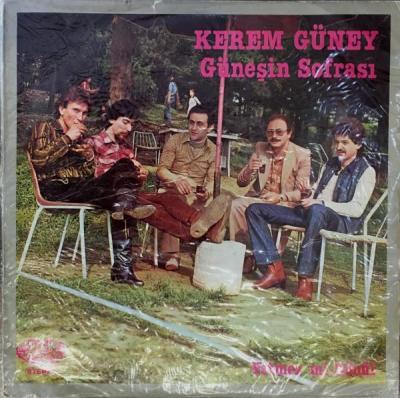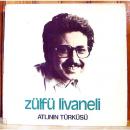Göklerde kartal gibiydim,
Kanatlarımdan vuruldum;
Mor çiçekli dal gibiydim,
Bahar vaktinde kırıldım.
Yar olmadı bana devir,
Her günüm bir başka zehir;
Hapishanelerde demir
Parmaklıklara sarıldım.
Coşkundum pınarlar gibi,
Sarhoştum rüzgarlar gibi;
İhtiyar çınarlar gibi
Bir gün içinde devrildim.
Ekmeğim bahtımdan katı,
Bahtım düşmanımdan kötü;
Böyle kepaze hayatı
Sürüklemekten yoruldum.
Kimseye soramadığım,
Doyunca saramadığım,
Görmesem duramadığım
Nazlı yarimden ayrıldım.
Kanatlarımdan vuruldum;
Mor çiçekli dal gibiydim,
Bahar vaktinde kırıldım.
Yar olmadı bana devir,
Her günüm bir başka zehir;
Hapishanelerde demir
Parmaklıklara sarıldım.
Coşkundum pınarlar gibi,
Sarhoştum rüzgarlar gibi;
İhtiyar çınarlar gibi
Bir gün içinde devrildim.
Ekmeğim bahtımdan katı,
Bahtım düşmanımdan kötü;
Böyle kepaze hayatı
Sürüklemekten yoruldum.
Kimseye soramadığım,
Doyunca saramadığım,
Görmesem duramadığım
Nazlı yarimden ayrıldım.
Contributed by Bernart Bartleby - 2018/2/20 - 08:22
Language: English
Traduzione inglese di Rukia Kuchiki dal suo blog Forgotten Hopes
PRISON SONG I (or I WAS LIKE AN EAGLE IN THE SKIES)
I was like an eagle in the skies,
I was shot in my wings;
I was like a purple flowered branch,
I was broken in the spring time.
I could not unite with my beloved,
Every day of mine is a different poison;
I held onto the iron
Bars in prisons.
I was full of the joys of spring,
Drunk like the winds;
Like old plane trees
I collapsed within a day.
My bread is tougher than my fortune,
My fortune is worse than my enemy;
I am weary of leading
Such a disgraceful life.
I am separated from my delicate beloved
whom I was afraid to ask anyone about,
whom I could not hold as much as I wanted,
whom I could not wait if I did not see.
I was like an eagle in the skies,
I was shot in my wings;
I was like a purple flowered branch,
I was broken in the spring time.
I could not unite with my beloved,
Every day of mine is a different poison;
I held onto the iron
Bars in prisons.
I was full of the joys of spring,
Drunk like the winds;
Like old plane trees
I collapsed within a day.
My bread is tougher than my fortune,
My fortune is worse than my enemy;
I am weary of leading
Such a disgraceful life.
I am separated from my delicate beloved
whom I was afraid to ask anyone about,
whom I could not hold as much as I wanted,
whom I could not wait if I did not see.
Contributed by B.B. - 2018/2/20 - 08:23
Con il titolo "Kanatlarimdan Vuruldum" nel disco "Yetmez Mi Gönül" realizzato nel 1979 da Kerem Güney e Güneşin Sofrası ed interamente dedicato alla poesia di Sabahattin Ali.

B.B. - 2018/5/28 - 13:42
Caro Bernard, a proposito di Sabahattin Ali, conosci quel capolavoro che è Leylim Ley a cui Livaneli ha messo la musica? in Turchia molti la interpretano e anche in Francia (l'ho ascoltata direttamente da Tulay German e dal maestro Francois Rabbath, sirano di Aleppo, sommo contrabbassista francese e amante del suono del saz, dove eccelle, che conobbi per tramite del comune amico bretonante Kirjuhel)
Flavio Poltronieri - 2018/5/29 - 18:25
×
![]()
Note for non-Italian users: Sorry, though the interface of this website is translated into English, most commentaries and biographies are in Italian and/or in other languages like French, German, Spanish, Russian etc.








Versi di Sabahattin Ali (1907-1948), scrittore, poeta e giornalista turco.
Si tratta già di per sé di una canzone (şarkı) ma è stata messa anche in musica, per esempio dal compositore e cantante Edip Akbayram.
Si veda anche Hapishane Şarkısı V (ya da Aldırma Gönül)
Sabahattin Ali è stato prima di tutto un insegnante. Insegnava lingua tedesca perchè da giovane e brillante laureato aveva vinto una borsa di studio in Germania. Ma al suo ritorno in Turchia venne preso di mira dalla polizia politica del regime di Atatürk e nel 1933 venne arrestato e imprigionato. E' a quel periodo che questa poesia si riferisce. Lo liberarono solo a patto che giurasse e celebrasse in versi la sua fedeltà al presidente. Lui lo fece, ma non era finita. I suoi versi e le sue parole continuavano a non convincere gli sgherri del potere. Lo imprigionarono di nuovo nel 1944. E nel 1948 lo assassinarono, in circostanze mai chiarite.
Oggi Sabahattin Ali è uno dei simboli per coloro che si oppongono alla deriva autoritaria di Erdogan.